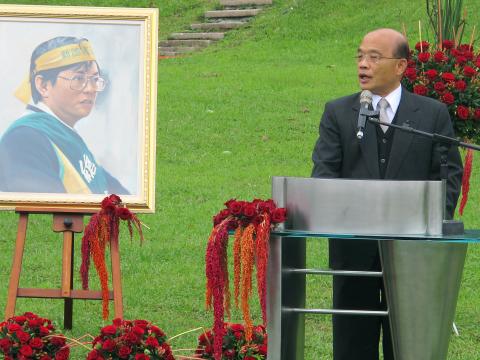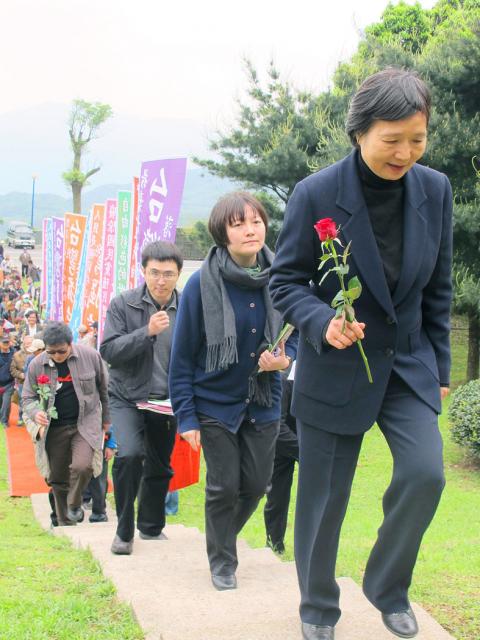Democratic Progressive Party (DPP) Chairman Su Tseng-chang (蘇貞昌) yesterday said that freedom in Taiwan has regressed since “a repressive government” had returned to power.
Su made the remarks at a ceremony in honor of Deng Nan-jung (鄭南榕), the late democracy advocate who set himself on fire 24 years ago and died in defense of “100 percent freedom of expression.”
The event took place at Deng’s tomb in New Taipei City’s (新北市) Jinbaoshan Cemetery in the morning.

Photo: Yu Chao-fu, Taipei Times
Su said it was a hard journey for Taiwanese to win the right of freedom of speech and it was made possible by people like Deng, who sacrificed himself.
Saying that 24 years ago there was no freedom in Taiwan under the then-authoritarian Chinese Nationalist Party (KMT) government, Su said people who had suffered from political repression or harassment knew that “certain words are said at home, not outside, or you could disappear or be caught anytime.”
However, Deng did not keep his mouth closed due to fear or threats, instead he spoke out, Su said.

Photo: Yu Chao-fu, Taipei Times
Deng spoke out not only with his mouth, but also by publishing his writings, he said.
He added that although Deng’s magazine Freedom Era Weekly (自由時代週刊) was banned, and permission for publishing the weekly was suspended again and again, he reapplied repeatedly and never gave up his intention in pursue democracy and freedom for the country.
Deng requested the authoritarian government to lift martial law, mark Feb. 28 an official memorial day for the 228 Massacre, and asked for a total freedom of expression, Su said.
He added that the KMT’s seizure, investigation, detention and imprisonment of Deng was intended to challenge his determination.
However, the KMT did not succeed, and it charged him with treason.
“Twenty-four years later, as we enjoy democracy and freedom of expression, we should not forget Deng’s spirit and the difficult road we have traveled,” Su said.
“After we have democracy, people voted for the then-authoritarian governors and allowed them to retain their power,” Su said.
Now they used more delicate and sophisticated ways to oppress freedom and democracy, Su said.
Freedom in Taiwan has been regressing since the KMT returned to power in 2008, and the US-based Freedom House has also said that freedom of the press in Taiwan has regressed, Su said.
Government propaganda is brainwashing people by saying that everything in China is good, while everything Taiwanese is bad, Su said.
Dealing with the situation, “people should appreciate what we own and learn to make right judgements,” Su added.
Born in Taiwan in 1947 to a family from China, Deng on numerous occasions in the 1980s overtly articulated his support for Taiwanese independence, at a time when a charge of sedition was in place to indict proponents of independence.
He established Freedom Era Weekly in 1984.
On April 7, 1989, he set himself on fire as heavily armed police attempted to break into his Taipei office, where he had barracaded himself for 71 days after he was charged with sedition for his magazine’s anti-government stance and for publishing a draft “Republic of Taiwan constitution” in 1988.

SHIPS, TRAINS AND AUTOMOBILES: The ministry has announced changes to varied transportation industries taking effect soon, with a number of effects for passengers Beginning next month, the post office is canceling signature upon delivery and written inquiry services for international registered small packets in accordance with the new policy of the Universal Postal Union, the Ministry of Transportation and Communications said yesterday. The new policy does not apply to packets that are to be delivered to China, the ministry said. Senders of international registered small packets would receive a NT$10 rebate on postage if the packets are sent from Jan. 1 to March 31, it added. The ministry said that three other policies are also scheduled to take effect next month. International cruise ship operators

NUMBERS IMBALANCE: More than 4 million Taiwanese have visited China this year, while only about half a million Chinese have visited here Beijing has yet to respond to Taiwan’s requests for negotiation over matters related to the recovery of cross-strait tourism, the Tourism Administration said yesterday. Taiwan’s tourism authority issued the statement after Chinese-language daily the China Times reported yesterday that the government’s policy of banning group tours to China does not stop Taiwanese from visiting the country. As of October, more than 4.2 million had traveled to China this year, exceeding last year. Beijing estimated the number of Taiwanese tourists in China could reach 4.5 million this year. By contrast, only 500,000 Chinese tourists are expected in Taiwan, the report said. The report

The Forestry and Nature Conservation Agency yesterday launched a gift box to market honey “certified by a Formosan black bear” in appreciation of a beekeeper’s amicable interaction with a honey-thieving bear. Beekeeper Chih Ming-chen (池明鎮) in January inspected his bee farm in Hualien County’s Jhuosi Township (卓溪) and found that more than 20 beehives had been destroyed and many hives were eaten, with bear droppings and paw prints near the destroyed hives, the agency said. Chih returned to the farm to move the remaining beehives away that evening when he encountered a Formosan black bear only 20m away, the agency said. The bear

HORROR STORIES: One victim recounted not realizing they had been stabbed and seeing people bleeding, while another recalled breaking down in tears after fleeing A man on Friday died after he tried to fight the knife-wielding suspect who went on a stabbing spree near two of Taipei’s busiest metro stations, Taipei Mayor Chiang Wan-an (蔣萬安) said. The 57-year-old man, identified by his family name, Yu (余), encountered the suspect at Exit M7 of Taipei Main Station and immediately tried to stop him, but was fatally wounded and later died, Chiang said, calling the incident “heartbreaking.” Yu’s family would receive at least NT$5 million (US$158,584) in compensation through the Taipei Rapid Transit Corp’s (TRTC) insurance coverage, he said after convening an emergency security response meeting yesterday morning. National